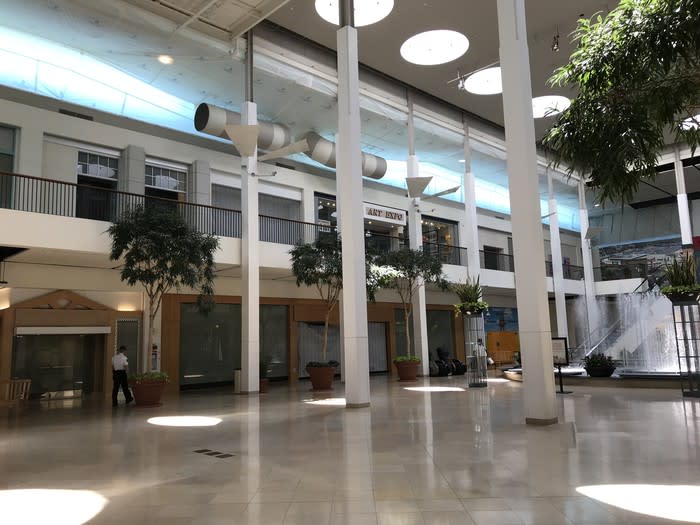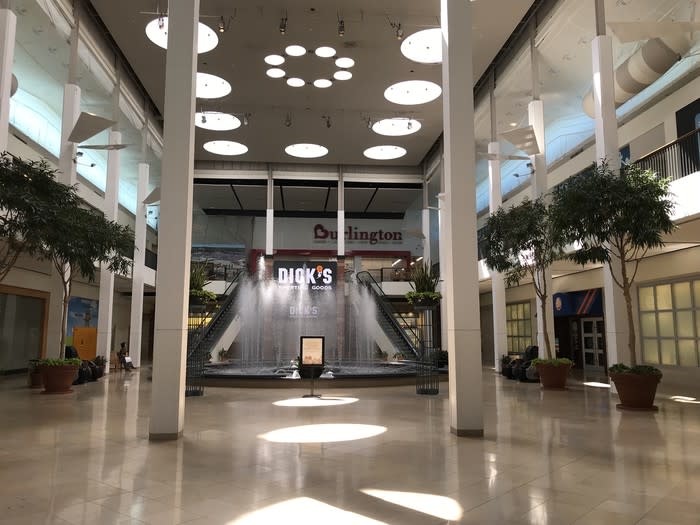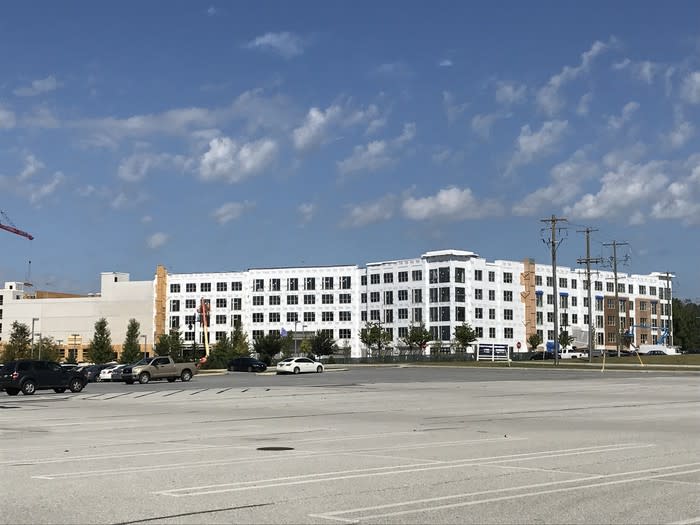Will PREIT's Worst Malls Die -- or Will They Evolve?
Last week, I described how Pennsylvania Real Estate Investment Trust's (NYSE: PEI) two best properties -- Cherry Hill Mall and Willow Grove Park Mall -- continue to thrive despite the broader headwinds affecting the retail sector. For the 12-month period that ended on June 30, both properties posted strong growth in comparable-store sales. As a result, sales per square foot reached $699 at Cherry Hill Mall and $763 at Willow Grove Park Mall.
However, not every PREIT mall is performing well. As part of my Philadelphia-area property tour over Labor Day weekend, I also visited three of the REIT's struggling malls in the area: Exton Square Mall, Plymouth Meeting Mall, and Moorestown Mall. What I saw highlighted both the upside potential and the challenges facing mid-tier mall owners as they try to decide how much to invest in sprucing up their properties to stay relevant.
Competing with Goliath
In a way, the three struggling PREIT malls that I visited are all suffering from the same problem: Each is located in the vicinity of a larger and far more successful mall. With overall mall traffic declining, tenants and customers are gravitating toward the larger, higher-traffic properties, creating the risk of a vicious spiral for PREIT's lower-tier malls.

Weaker malls like Exton Square Mall are quickly being left behind in today's retail environment. Image source: Author.
In the case of Moorestown Mall, the stronger competitor is PREIT's very own Cherry Hill Mall, which is less than four miles away. Cherry Hill Mall's gross leasable area exceeds 1.3 million square feet, including nearly 700,000 square feet of non-anchor space, whereas Moorestown Mall has about 932,000 square feet of leasable area, of which less than 400,000 square feet is non-anchor space. Sales per square foot currently stands at $413 for Moorestown Mall, compared to $699 for its larger neighbor.
Exton Square Mall and Plymouth Meeting Mall face an even bigger challenge. The two malls are 14 miles and less than 10 miles, respectively, from King of Prussia, one of the largest malls in the world. King of Prussia has more than 400 stores -- including many unique offerings that can't be found anywhere else in the Philadelphia metro area -- more than twice as many stores as Exton Square and Plymouth Meeting have combined.
As of a little over a year ago, King of Prussia produced sales per square foot of $975. By contrast, Exton Square Mall and Plymouth Meeting Mall both produce less than $350 per square foot. Adding to its difficulties, Plymouth Meeting Mall is also just 13 miles from PREIT's highly successful Willow Grove Park Mall.

Plymouth Meeting Mall has been overshadowed by larger malls located nearby. Image source: Author.
Working to reshape Moorestown Mall
Moorestown Mall lost its Macy's (NYSE: M) anchor in early 2017, as the department store giant opted to focus on its better-performing Cherry Hill store. PREIT bought the property from Macy's for $8.9 million and began redeveloping it for several new tenants. Over the past year, TJX Companies concepts HomeSense and Sierra opened stores in the former Macy's building, along with Five Below. A Michaels store will follow in early 2020.
Thanks to the first wave of new tenants, traffic to Moorestown Mall rose 5.7% year over year in the first six months of 2019. The new tenants are lifting PREIT's rental income at Moorestown Mall. Management recently announced that Planet Fitness will join the tenant roster next year, which will add to the property's momentum.
PREIT also sees Moorestown Mall as a good site for its densification efforts. The REIT hopes to add 33,800 square feet of space in two new outparcel buildings near the Macy's store. The property is also on track to receive approval for up to 1,015 new housing units. PREIT expects to generate between $150 million and $300 million across its full portfolio of malls by selling land to multifamily and hotel developers.

Lots of excess parking space at Moorestown Mall could be built upon. Image source: Author.
That said, of the new anchor replacement tenants, only HomeSense connects to the mall interior. As a result, much of the extra traffic to the mall isn't benefiting the interior tenants, which generally pay the highest rents. Indeed, the mall was nearly deserted when I visited around noon on the Saturday of Labor Day weekend, which should be a relatively busy time. Furthermore, non-anchor occupancy stands at a mediocre 82.4% today.
Moorestown Mall's challenges aren't over, either. One of the remaining anchors -- Lord & Taylor -- recently announced that it will close later this year. Sears, another anchor tenant, probably won't last much longer, given its well-documented struggles.

Despite the recent Macy's redevelopment, empty spaces abound inside Moorestown Mall. Image source: Author.
Can new anchors turn Plymouth Meeting Mall around?
As at Moorestown Mall, the Macy's anchor store at Plymouth Meeting Mall closed in early 2017. This has led to a loss of traffic at the mall, causing non-anchor occupancy to plunge to 81.3%, compared to 91.2% at the end of 2016.
The good news is that PREIT's anchor replacements are about to open. Dick's Sporting Goods and Burlington will open stores later this month, connecting to the first and second floors of the mall interior, respectively. This could help drive more traffic into the mall, boosting sales per square foot and making it easier to attract new tenants. A fitness club and two smaller tenants -- all with exterior entrances -- will also open this fall, with a Michaels store on tap for early 2020.

A pair of new anchor stores could breathe new life into this side of Plymouth Meeting Mall. Image source: Author.
Plymouth Meeting Mall also could be an attractive location for housing, given the presence of numerous dining, fitness, and entertainment offerings -- plus a Whole Foods store -- on the property. There is ample excess parking lot space that could be sold to a developer.
Cashing out at Exton Square
Exton Square Mall is far and away the most-clearly "doomed" mall in PREIT's portfolio. The mall still features Macy's, regional department store chain Boscov's, and Japanese entertainment chain Round1 as anchors. (Sears is the fourth anchor, but that store recently began a liquidation sale.) However, non-anchor occupancy has fallen to just 65.1%, down by more than 20 percentage points since the beginning of 2017.

Large sections of Exton Square Mall are mostly vacant. Image source: Author.
Moreover, a substantial amount of the non-anchor space is taken up by non-traditional tenants like medical offices, a chess club, a local art studio and gallery, and the regional chamber of commerce. These tenants likely pay very little in rent and don't contribute much to the mall ecosystem. Not surprisingly, most of the mall looked like a ghost town when I visited.
PREIT CEO Joe Coradino acknowledged earlier this year that Exton Square "probably doesn't want to be a mall," despite being in a good location. Indeed, PREIT sold a Whole Foods store recently built on an outparcel for $22.1 million earlier this year. Last fall, it generated $10.3 million by selling four acres of land to a multifamily developer that is building more than 300 upscale multifamily units.

PREIT sold the land parcel where this residential building is under construction for $10.3 million. Image source: Author.
Over time, the Exton Square property needs to be thoroughly redeveloped, perhaps with additional housing, offices, hotels, and a smaller retail component. However, PREIT doesn't have the financial capacity to take that project on single-handedly. Instead, the REIT will look to either sell the property or bring in a joint venture partner.
Even PREIT's worst malls have potential
One of PREIT's biggest strengths is that more than half of its properties are located in the densely populated Philadelphia and Washington, D.C., metro areas. That creates plenty of options for reinventing lower-performing properties, where the traditional model of a department store-anchored mall is no longer working.
PREIT has made plenty of progress toward redeveloping Moorestown Mall and Plymouth Meeting Mall and monetizing Exton Square Mall. However, the REIT will need to continue finding creative solutions to maximize the value of these properties, while leaning on its higher-traffic malls to drive most of its future growth.
More From The Motley Fool
John Mackey, CEO of Whole Foods Market, an Amazon subsidiary, is a member of The Motley Fool's board of directors. Adam Levine-Weinberg owns shares of Macy's, Pennsylvania REIT, and The TJX Companies and is long January 2021 $13 calls on Macy's. The Motley Fool owns shares of and recommends Amazon and Planet Fitness. The Motley Fool recommends Five Below, The Michaels Companies, and The TJX Companies. The Motley Fool has a disclosure policy.
Will PREIT's Worst Malls Die -- or Will They Evolve? was originally published by The Motley Fool

 Yahoo Finance
Yahoo Finance 